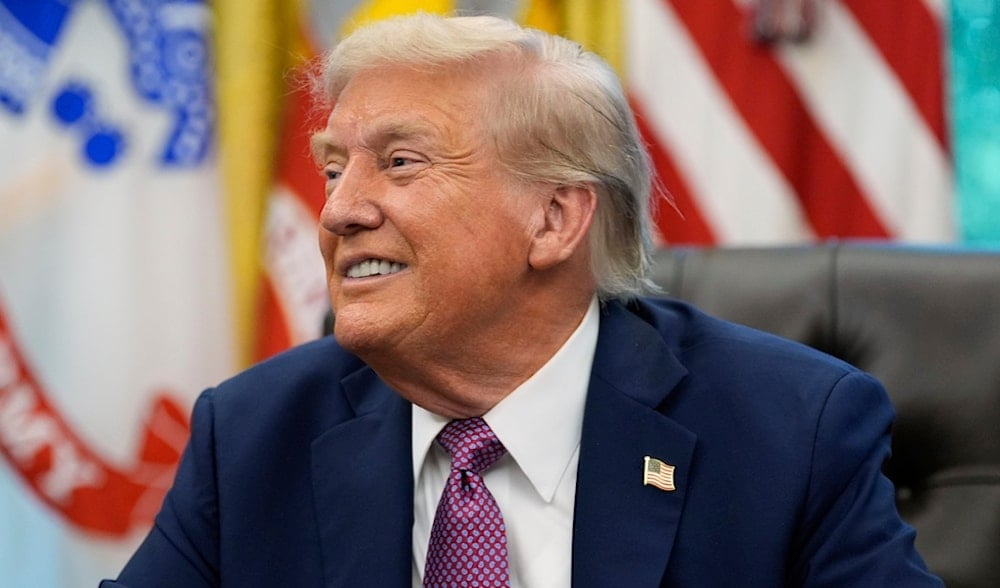Trump foreign investment vows may turn US to state capitalism: Op-ed
Aaron Bartnick argues that Trump’s $1.5 trillion in foreign investment pledges from Japan, South Korea, and the EU could distort US markets, promote state capitalism, and damage the US's economic credibility.
-

President Donald Trump smiles as he speaks in the Oval Office of the White House, Friday, Sept. 5, 2025, in Washington (AP)
In a recent op-ed, Aaron Bartnick, a Global Fellow at Columbia University’s Center on Global Energy Policy, warns that President Donald Trump’s highly publicized foreign investment pledges, totaling $1.5 trillion, could distort US markets and push the country toward state capitalism.
In an August 5 interview with CNBC, Trump praised his trade deals with Japan, South Korea, and the European Union as the “greatest trade deals in the history of our country.” These agreements, Bartnick notes, hinge on unprecedented foreign investment commitments from three of Washington’s largest trade partners.
According to Bartnick, the appeal of these pledges lies in their optics rather than their economic viability. While they may serve as short-term political wins, he argues that they are unlikely to deliver tangible economic benefits such as job creation or increased productivity.
At best, Bartnick sees these pledges as aspirational tools to avoid harsh tariffs; at worst, they reflect an inefficient reallocation of capital and a troubling tilt toward centralized economic control.
Trump’s foreign investment gambit
Bartnick emphasizes that the investment figures cited in the deals are highly unrealistic. From 2021 to 2023, total foreign direct investment (FDI) into the United States reached just over $1 trillion. Expecting Japan, South Korea, and the EU to contribute an additional $1.5 trillion in the coming years would represent a 150% increase; an improbable scenario by any historical standard.
He points out that Japan’s $550 billion pledge nearly equals the total it has invested in the US since World War II. Meanwhile, EU officials have already described their commitment as an intention rather than a binding agreement.
Bartnick writes that Trump has made clear the true purpose of these pledges: to increase leverage in tariff negotiations. In one example, Trump stated on Truth Social that South Korea could “buy down” a 25% tariff for $350 billion.
For Bartnick, this reinforces the notion that the investment figures are more about optics and political pressure than actual economic development.
Market consequences of forced foreign capital
Should these investments actually materialize, Bartnick warns that the influx of foreign capital could seriously distort US markets.
If there were a natural demand for $1.5 trillion in new investment, the capital would already be flowing into the economy. Forcing it into a finite pool of viable companies and sectors could inflate asset valuations and deepen market instability.
Industries such as semiconductors, biotechnology, and critical minerals may lack the absorptive capacity to handle sudden, large-scale investment. While sectors like chemicals or industrial manufacturing might accommodate tens of billions in capital, the vast majority of the pledged investment would struggle to find a productive home.
Shift toward state capitalism?
Bartnick expresses particular concern over the lack of transparency in how this capital would be managed. Citing Trump’s comments to CNBC, “The details are $600 billion to invest in anything I want. Anything. I can do anything I want…”, Bartnick argues this signals a dangerous departure from free market principles.
According to Bartnick, this approach resembles the kind of centralized economic planning long criticized by US policymakers in other countries, particularly China.
Practices such as awarding “golden shares,” erecting tariff barriers, or using government incentives to favor certain industries are all hallmarks of state-led capitalism, an economic model that Bartnick contends the US has historically rejected.
Treating US like an emerging market
Bartnick concludes that if the United States insists on behaving like an emerging market, relying on politicized capital and opaque deal-making, then its trade partners may begin treating it as such. This could result in fewer deals, less favorable terms, and higher risk premiums for US companies and consumers.
While Bartnick acknowledges that foreign investment remains a positive and necessary force in the US economy, he cautions that prioritizing political wins over economic fundamentals could lead to inflation, asset bubbles, and increased volatility.
Rather than strengthening the economy, these headline-driven deals risk eroding the credibility and openness that have long made the US an attractive destination for global capital.
Read more: Trump warns US may have lost India, Russia to China

 4 Min Read
4 Min Read








